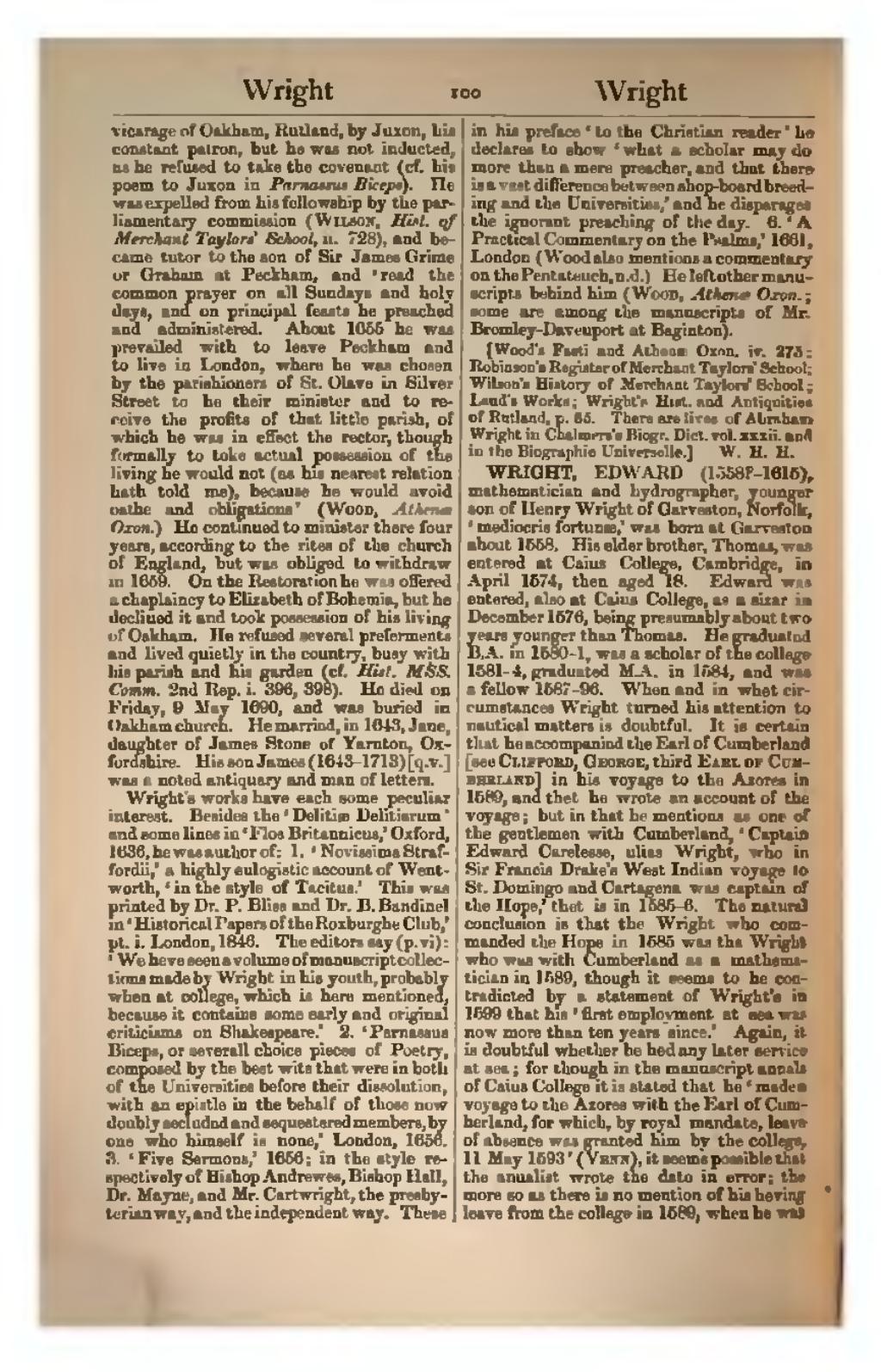the vicarage of Oakham, Rutland, by Juxon, his constant patron, but he was not inducted, as he refused to take the covenant (cf. his poem to Juxon in Parnassus Biceps). He was expelled from his fellowship by the parliamentary commission (Wilson, Hist. of Merchant Taylors' School, ii. 728), and became tutor to the son of Sir James Grime or Graham at Peckham, and ‘read the common prayer on all Sundays and holy days, and on principal feasts he preached and administered. About 1655 he was prevailed with to leave Peckham and to live in London, where he was chosen by the parishioners of St. Olave in Silver Street to be their minister and to receive the profits of that little parish, of which he was in effect the rector, though formally to take actual possession of the living he would not (as his nearest relation hath told me), because he would avoid oaths and obligations’ (Wood, Athenæ Oxon.) He continued to minister there four years, according to the rites of the church of England, but was obliged to withdraw in 1659. On the Restoration he was offered a chaplaincy to Elizabeth of Bohemia, but he declined it and took possession of his living of Oakham. He refused several preferments and lived quietly in the country, busy with his parish and his garden (cf. Hist. MSS. Comm. 2nd Rep. i. 396, 398). He died on Friday, 9 May 1690, and was buried in Oakham church. He married, in 1643, Jane, daughter of James Stone of Yarnton, Oxfordshire. His son James (1643–1713) [q. v.] was a noted antiquary and man of letters.
Wright's works have each some peculiar interest. Besides the ‘Delitiæ Delitiarum’ and some lines in ‘Flos Britannicus,’ Oxford, 1636, he was author of: 1. ‘Novissima Straffordii,’ a highly eulogistic account of Wentworth, ‘in the style of Tacitus.’ This was printed by Dr. P. Bliss and Dr. B. Bandinel in ‘Historical Papers of the Roxburghe Club,’ pt. i. London, 1846. The editors say (p. vi): ‘We have seen a volume of manuscript collections made by Wright in his youth, probably when at college, which is here mentioned, because it contains some early and original criticisms on Shakespeare.’ 2. ‘Parnassus Biceps, or severall choice pieces of Poetry, composed by the best wits that were in both of the Universities before their dissolution, with an epistle in the behalf of those now doubly secluded and sequestered members, by one who himself is none,’ London, 1656. 3. ‘Five Sermons,’ 1656; in the style respectively of Bishop Andrewes, Bishop Hall, Dr. Mayne, and Mr. Cartwright, the presbyterian way, and the independent way. These in his preface ‘to the Christian reader’ he declares to show ‘what a scholar may do more than a mere preacher, and that there is a vast difference between shop-board breeding and the Universities,’ and he disparages the ignorant preaching of the day. 6. ‘A Practical Commentary on the Psalms,’ 1661, London (Wood also mentions a commentary on the Pentateuch, n.d.). He left other manuscripts behind him (Wood, Athenæ Oxon.; some are among the manuscripts of Mr. Bromley-Davenport at Baginton).
[Wood's Fasti and Athenæ Oxon. iv. 275; Robinson's Register of Merchant Taylors' School; Wilson's History of Merchant Taylors' School; Laud's Works; Wright's Hist. and Antiquities of Rutland, p. 85. There are lives of Abraham Wright in Chalmers's Biogr. Dict. vol. xxxii. and in the Biographie Universelle.]
WRIGHT, EDWARD (1558?–1615), mathematician and hydrographer, younger son of Henry Wright of Garveston, Norfolk, ‘mediocris fortunæ,’ was born at Garveston about 1558. His elder brother, Thomas, was entered at Caius College, Cambridge, in April 1574, then aged 18. Edward was entered, also at Caius College, as a sizar in December 1576, being presumably about two years younger than Thomas. He graduated B.A. in 1580–1, was a scholar of the college 1581–4, graduated M.A. in 1584, and was a fellow 1587–96. When and in what circumstances Wright turned his attention to nautical matters is doubtful. It is certain that he accompanied the Earl of Cumberland [see Clifford, George, third Earl of Cumberland] in his voyage to the Azores in 1589, and that he wrote an account of the voyage; but in that he mentions as one of the gentlemen with Cumberland, ‘Captain Edward Carelesse, alias Wright, who in Sir Francis Drake's West Indian voyage to St. Domingo and Cartagena was captain of the Hope,’ that is in 1585–6. The natural conclusion is that the Wright who commanded the Hope in 1585 was the Wright who was with Cumberland as a mathematician in 1589, though it seems to be contradicted by a statement of Wright's in 1599 that his ‘first employment at sea was now more than ten years since.’ Again, it is doubtful whether he had any later service at sea; for though in the manuscript annals of Caius College it is stated that he ‘made a voyage to the Azores with the Earl of Cumberland, for which, by royal mandate, leave of absence was granted him by the college, 11 May 1593’ (Venn), it seems possible that the annalist wrote the date in error; the more so as there is no mention of his having leave from the college in 1589, when he was
